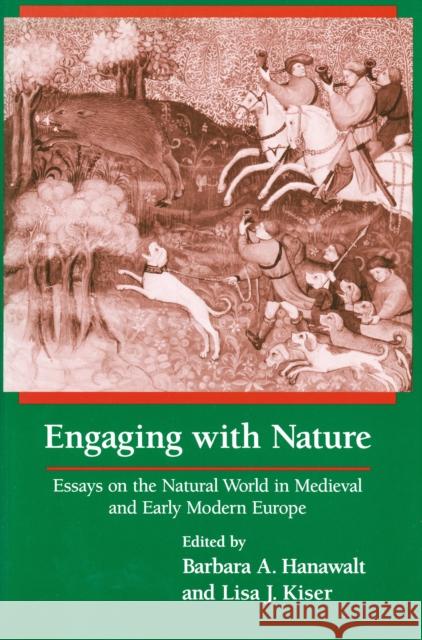Engaging With Nature: Essays on the Natural World in Medieval and Early Modern Europe » książka
Engaging With Nature: Essays on the Natural World in Medieval and Early Modern Europe
ISBN-13: 9780268030834 / Angielski / Miękka / 2008 / 244 str.
Engaging With Nature: Essays on the Natural World in Medieval and Early Modern Europe
ISBN-13: 9780268030834 / Angielski / Miękka / 2008 / 244 str.
(netto: 111,90 VAT: 5%)
Najniższa cena z 30 dni: 116,06
ok. 22 dni roboczych.
Darmowa dostawa!
Historians and cultural critics face special challenges when treating the nonhuman natural world in the medieval and early modern periods. Their most daunting problem is that in both the visual and written records of the time, nature seems to be both everywhere and nowhere. In the broadest sense, nature was everywhere, for it was vital to human survival. Agriculture, animal husbandry, medicine, and the patterns of human settlement all have their basis in natural settings. Humans also marked personal, community, and seasonal events by natural occurrences and built their cultural explanations around the workings of nature, which formed the unspoken backdrop for every historical event and document of the time.Yet in spite of the ubiquity of nature s continual presence in the physical surroundings and the artistic and literary cultures of these periods, overt discussion of nature is often hard to find. Until the sixteenth century, responses to nature were quite often recorded only in the course of investigating other subjects. In a very real sense, nature went without saying.As a result, modern scholars analyzing the concept of nature in the history of medieval and early modern Europe must often work in deeply interdisciplinary ways. This challenge is deftly handled by the contributors to "Engaging with Nature," whose essays provide insights into such topics as concepts of animal/human relationships; environmental and ecological history; medieval hunting; early modern collections of natural objects; the relationship of religion and nature; the rise of science; and the artistic representations of exotic plants and animals produced by Europeans encountering the New World. As scholars of medieval and early modern Europe increasingly embrace environmental perspectives and animal studies, " Engaging with Nature" will be recognized as a landmark collection in the field. Taken together, the essays in this volume provide a synthetic overview of critical developments in the many disciplines that are now incorporating the approaches of natural and environmental studies. Each essay represents a substantial advance in scholarship and thought in its particular field. This is an essential collection for literary and cultural historians, and for historians of economy and society, art and ideas. Rita Copeland, University of Pennsylvania " Engaging with Nature" vividly captures the breadth and depth of human interactions with the natural world in premodern Europe. Its multidisciplinary approach generates new questions about how Europeans understood and connected with nature and delves into issues that will interest the specialist and the general reader alike. The book challenges readers to rethink not just the history of human engagement with nature but also the many ways the past has influenced our modern conceptions of ecology and environment. James Masschaele, Rutgers University"This substantial collection of articles is far more than a response to current obsessions with climate change.It is a thought-provoking demonstration of the inter-disciplinary character of research on medieval history and culture.Students of medieval and early-modern society and economy, literature, philosophy, and art, will find much that is new in these essays, and much to provoke their own thinking about the vexed relationship of human societies with their natural surroundings." Fredric Cheyette, Emeritus professor of history, Amherst College "Engaging with Nature" is a deeply pleasurable volume to read. Using an incredible range of primary and secondary sources, the authors richly realize the methodological promise inherent in the emergent field of medieval and pre-modern studies on the history of nature. Kathleen Biddick, Temple University "Engaging with Nature" is a collection of impeccable scholarship that will make a highly original contribution to the emergent field of medieval and pre-modern studies on the history of nature." Claire Sponsler, University of Iowa"











